Family legacies and the state’s Jim Crow past underlie a fight over mineral rights on a stretch of South Texas scrubland

KARNES COUNTY — A few miles southeast of where a two-lane farm road cuts across Highway 80 lies a sliver of land — 147.5 acres, to be exact — holding the stories of two Texas families, one Black and one white.
For almost 100 years, each family has held a half-interest in the property in northeast Karnes County. One family stayed on it, sinking deep roots and growing its wealth. The other vanished from it, scattering across Texas and beyond, succeeding generations often unaware they owned a share of the scrub-studded parcel.
But within the past 15 years, oil and gas riches have made the land valuable, and descendants of the two families must now reckon with the disparate fortunes found or lost since their ancestors crossed paths here. Doing so means untangling the knots that bind together not just century-old family matters and business deals, but also the racial oppression that so often determined who was allowed to prosper.
On one side are the Korths, a white family considered pioneers of the area, fighting for full ownership of a beloved ranch they believe is theirs. On the other side are the Eckfords: hundreds of descendants of a formerly enslaved couple, trying to reclaim their stake in the land and the lost link to their inheritance. Both families are hoping to share in royalty payouts that could be worth millions of dollars.
Out on this expanse in the heart of the Eagle Ford Shale, the circumstances surrounding how these acres of scrub and ranchland passed from one family to the other are complex, involving life during a time of overt racism, an insanity trial, a clouded deed of trust and the sale of an estate. All is now under scrutiny as the courts determine whether the Korths effectively divested the Eckfords of their half-interest over the more than seven decades during which the land has been in their possession.
Theirs is a story of a land dispute but it’s also about legacy. About one family wanting to hold on to the investment of generations and another seeking justice over what went missing in the days of Jim Crow.
And none of it would have happened but for a shale play that brought oil giants and their hungry interests to town, throwing into question who rightfully owns the 147.5-acre tract.
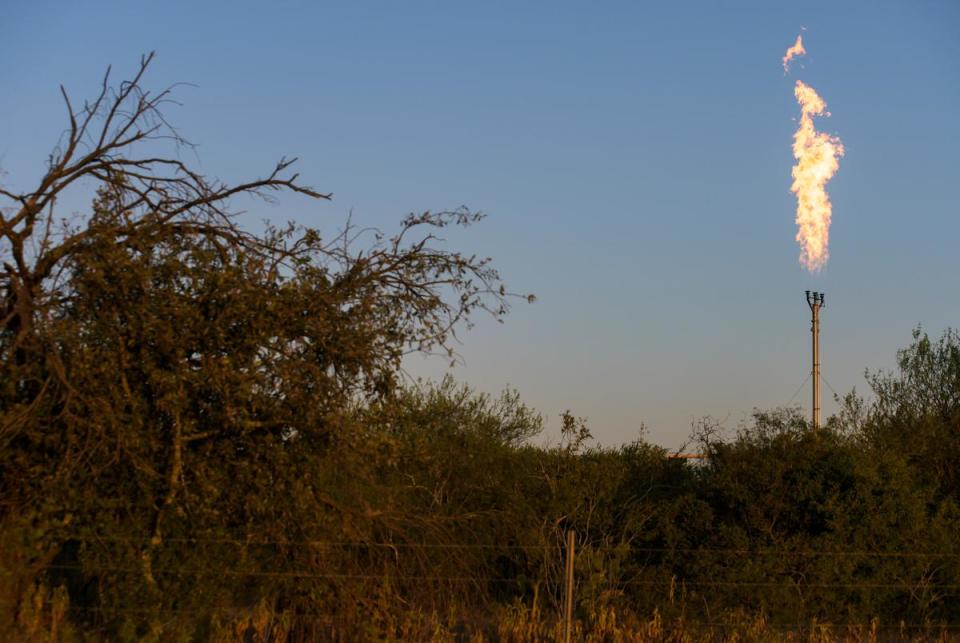
The landmen arrive
The first mention of the Eagle Ford Shale in Karnes County’s community newspaper appeared in the classifieds section in late 2009.
“Have you been contacted by an oil and gas landman recently?” the short announcement asked. It pointed readers to a website where landowners posted the sort of lease offers on the table for those lucky enough to own property within the 26-county swath over the geological formation rich in oil and natural gas.
Drilling in the nation’s second largest shale field, covering roughly 20,000 square miles in an arc stretching northeast from Laredo, took off in 2010. It transformed Karnes County’s ranching and farming economy into an oil and gas powerhouse with well pads scattered throughout its brush and grasslands.
Oil and gas companies had begun poring over property deeds and approaching local landowners to sign over drilling rights as early as 2007. That’s when representatives for Crashiel Resources, acting on behalf of a drilling subsidiary of ConocoPhillips, reached out to Lou Eda Korth Stubbs Nixon and Ellen Ann Korth Vickers.
The Korth sisters had inherited many acres of land from their father, a successful rancher and banker who had inherited it from his father, Fritz Korth, both prominent figures in the area. The land included 147.5 acres on the eastern end of one of their ranches, shaped like a capital F, on which the family had plowed the earth, planted grass, hunted doves and coyotes and leased the land to graze cattle.
But as the landman and title lawyers assigned to their property tracked down its ownership, a different family name emerged. An inventory of Fritz Korth’s estate at the time of his death in 1948 noted that he owned only an undivided half interest in the 147.5 acres “known as the Eckford Estate.”
“We had always thought we owned it,” Ellen Ann would say later.
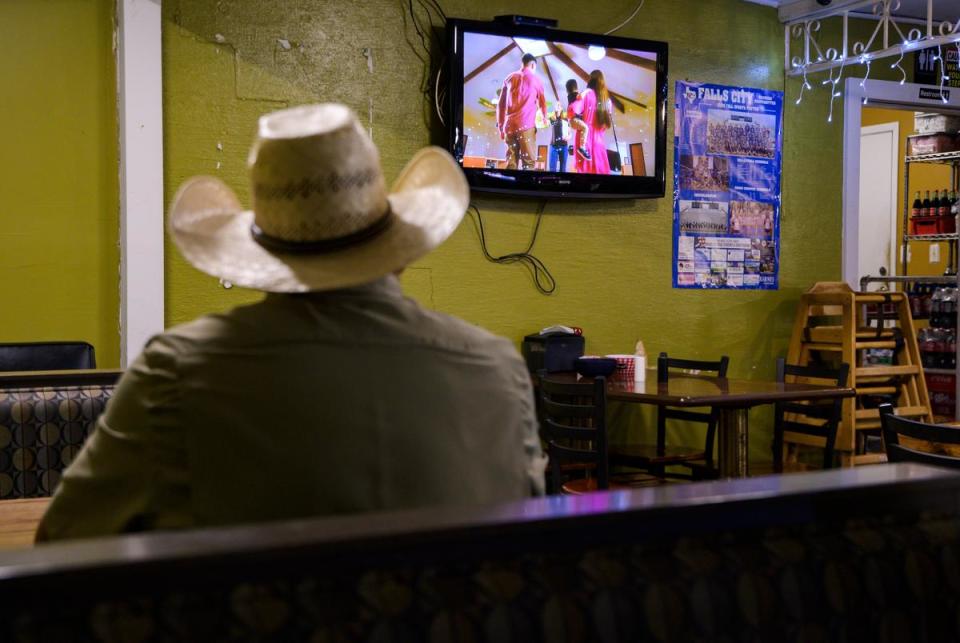
In a November 2007 oil, gas and mineral lease proposal sent to Lou Eda, the landman included a breakdown of the Korths’ mineral interests showing the 147.5 acres — which would net the Korth sisters an $18,437 signing bonus — were jointly owned by the Korth descendants and what it described as the “Estate of Louis Eckford, deceased.”
The Korth family entered into a contract with ConocoPhillips in early 2008, signing division orders that reflected their shared half interest in the tract.
It wasn’t until 2011 that ConocoPhillips began contacting the owners of the other half interest listed as belonging to Louis Eckford. By then, there were more than 200 rigs at work in the Eagle Ford Shale.
A century worth of records and deeds linked the land to Louis and Eliza Eckford. They had acquired it in the late 1880s, less than 30 years from the day freedom finally came to the Black people enslaved in Texas. Eliza’s half had been sold to Fritz Korth after her death, but Louis had died without a will. Under state law at that time, his share would have been inherited by his nine children and later by their descendants. There were at least 200 at the point ConocoPhillips began tracking them down.
While some Eckford descendants were still in Texas, some still residing in Karnes County even, many had not known about their lasting connection to this place.
In a January 2011 post on The Mineral Rights Forum website, Natasha Haskins described her shock when she found out she had an interest in her ancestors’ land.
“I don’t know anything about the property because it was owned by my great, great, great grandparents in the early 1900’s and since the majority of my father's side family members are deceased with the exception of nine, I automatically qualified as the heir to 1/2 the mineral rights,” she wrote, asking for advice on what she was getting herself into.

The Eckfords
Louis Eckford was born in Texas around 1840. His enslavement appears to be recorded on page 42 of the 1860 census of Karnes County.
He and Eliza, who was born in Mississippi, wed the next year and welcomed their first child a year later — a union that wasn’t recognized for at least a decade when the Texas Legislature legalized the marriages of people “formerly held in bondage” and legitimized their children.
Much of what is known about the couple has been passed down through family lore and deduced by piecing together history captured in handwritten documents. Some of the early work of pulling those threads together was done by Willie Jean Eckford Hardaway, a great-great-granddaughter of Louis and Eliza who was among the first descendants to hear from the companies interested in the family’s mineral rights.
Willie Jean was steadfast in her exploration, using quiet moments to escape to a small office in the back of her San Antonio home. She dug deep, uprooting documents confirming some of the details of stories that until then had been faint tales passed by word of mouth. Other details were lost to the past; her father had been an only child and died decades before. So deeper she went trying to fill in as many of the empty spaces in the tapestry of her family’s history as she could.
“It was mostly [out of] curiosity,” said Quinton Hardaway Jr., who became her widower when she died of cancer in 2016. “Curiosity got hold of her, and that’s when she took it and ran with it.”
What eventually became known is that after emancipation, Louis and Eliza settled in the Flaccus community — also called the McTennel Colony — a settlement of Black residents where many freed slaves retained the surnames of the people who had held them as property.
They appeared to mesh with the local white community. In June 1891, the residents of Flaccus wrote to the editor of the Karnes County News to thank “prominent white friends,” including the editor and the county judge, for joining them at a recent festivity, possibly a Juneteenth celebration.
“We the colored citizens of the McTennell colony wish to make a few remarks concerning our celebration,” they wrote. “It passed off quietly and we hope all who were present enjoyed themselves.” (The spellings of McTennel vary in records.)
Louis’ name appeared on the county voter rolls as early as 1867, but the stench of the Civil War still permeated the area where most residents had supported the Confederacy. The Knights of the Golden Circle, a secretive organization that supported the preservation of slavery, had been active in the area with a “castle” in nearby Helena. White residents in the county made the trip to Karnes City to attend minstrel shows.
More generally, Texas was a segregated society controlled by white men who denied Black people full citizenship and pursued measures to keep them subservient. The state Legislature initially refused to ratify the Thirteenth and Fourteenth Amendments, which abolished slavery and guaranteed equal rights under the law. And the white power structure either sanctioned or turned a blind eye to the racist terror Black Texans faced, from lynch mobs to the emergence of the Jim Crow.
Despite all of that, freed slaves and other Black people seemed to find prosperity in Karnes County. Louis and Eliza, with their growing family, began acquiring and selling land near McTennel Creek with the 1880 census listing him as a property owner and farmer. But their fortunes would turn around the time the county promoted itself as the “banner county of the south west” rich in fertile lands and access to the railroads connecting it to the major hubs of San Antonio and Houston.
In 1889, Louis purchased land, including the 147.5 acres in question, from a prominent family.
Four years later — just after a second transaction involving the land that showed it had been paid off in full — he was dragged from his home, beaten and jailed, according to family lore. A month later, records show, Louis was declared insane by a jury. It was an astonishing turn of events, considering that just a few months before he had been asked to give remarks during the Arbor Day celebration in McTennel Colony, which was described by a local paper as a settlement of “intelligent, progressive and prosperous colored people.”
Louis was put “under restraint and medical treatment” at a state facility in Austin, at the time known as the Texas State Lunatic Asylum. The court in Louis’ trial had determined there was no one to manage his affairs, leading his descendants to believe his trial amounted to nothing more than a land grab, but Eliza hired an attorney and convinced a probate court to allow her to serve as his guardian.
When Louis died in 1896, his stake in the 147.5 acres passed to their nine children while Eliza retained half. (Eliza later gained slightly more than half when she was preceded in death by a child whose share was distributed to his mother and siblings.)
In retracing their story, Louis’ descendants initially believed he died in a fire at the state hospital, buried in an unmarked grave in the capital city, but The Texas Tribune found a newspaper clipping from 1894 that indicates he made it back home two years before his death.
“We learn that Louis Eckford, a former good colored citizen of this county, but who has been confined in the lunatic asylum in Austin for some time, has so for recovered as to allow his return home,” read an entry in the local paper. “His son, Will, left for Austin Wednesday after his father.”
Ownership of the 147.5 acres remained unchanged — with Eliza preparing a will that would leave her share to her seven surviving children — through 1923 when Eliza took out a $300 loan from Fritz Korth, a local rancher known as a money lender who would also serve as a director of the local bank. The loan was secured by a deed of trust on the land.
The Eckford descendants today have questions about the loan, doubting Eliza would put the property on the line when it was worth far more than the loan amount.
But the deed of trust would come into play when she died two years later, a year short of the repayment term on the loan. In her will, Eliza had picked someone to administer her estate, but a probate judge rejected Eliza’s choice, arguing he lived too far from Karnes County. The judge instead appointed T. D. Ruckman, part of a prominent family that owned the local bank.
It’s unknown why the Eckford children didn’t claim any of the land while its sale to pay Eliza’s debts languished for 14 years — or if they knew they still owned the half that had belonged to Louis.
But in 1939, Fritz Korth paid $735.50 for it, and the 147.5-acre tract passed into the control of the Korths.
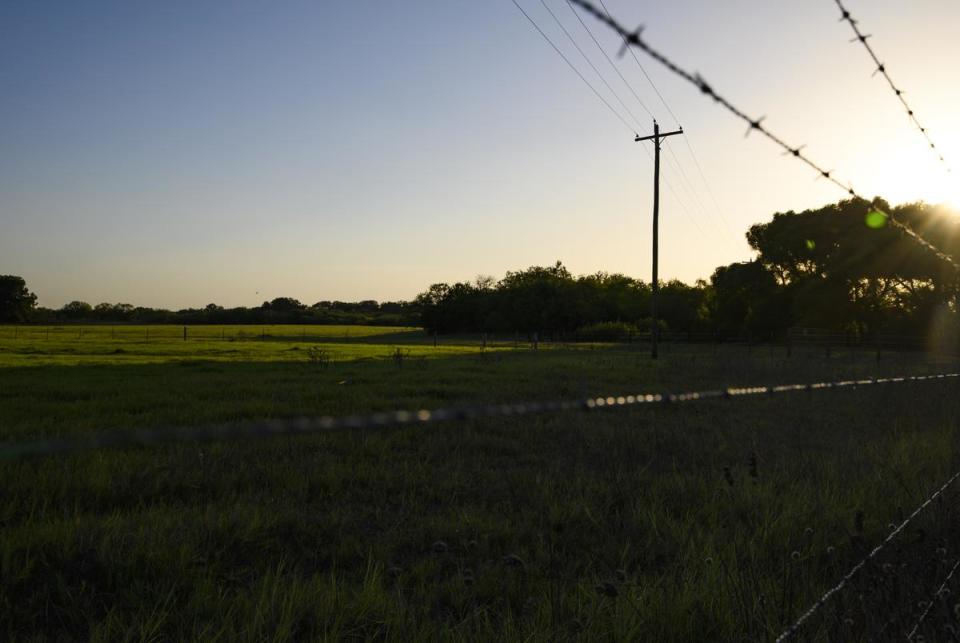
The Korths
Though the area was first inhabited by indigenous people and later Spanish colonists and Mexican settlers, many of the small towns that dotted early Karnes County were established in the mid- to late 1800s by what are described locally as pioneering families, among them the Korths.
With its loamy soils spreading out from the banks of the San Antonio River, the land was productive, and the arrival of the railroads broadened access to markets.
A longtime resident of the town of Runge, Fritz Korth was a well-known figure. He established his wide-ranging business and ranch interests early on, cultivating land and selling property. He would wear various hats throughout his life, serving as a Runge city commissioner and a director of the Karnes County National Bank.
His two sons would grow into prominence themselves. Fred Korth, an attorney, served as secretary of the Navy under President John F. Kennedy, while Romeo Korth took after his father as a rancher and banker, succeeding Fritz as a director of the bank and serving on a local school board and various associations.
Fritz’s death in 1948 made the front page of the Karnes County News, which called him a “widely known, good and beloved pioneer citizen” and described his funeral as “one of the largest ever held here.”
It fell to the brothers to manage his estate. The probate proceedings noted Fritz’s half interest in the 147.5 acres on which the family had maintained cattle and worked the land since taking possession in 1939.
The Korth ownership share was split between the brothers and their mother, though Romeo would eventually buy them out.
The 147.5 acres had become part of a larger ranch called the “The Colony” that Romeo and his family would work for many years to come, though some ranch hands would continue referencing the smaller area as the Eckford tract.
Romeo’s grandchildren, who knew him as Daddy Ome, would later recall summers spent on the ranch, stacking hay bales and eating his dove and quail soup. His daughter Lou Eda, having gone to school in San Antonio and married while in college, would eventually return to help run the ranch, modernizing its operations.
Over generations, the wealth drawn in part from the family’s ranching enterprises allowed them to broaden their portfolio. Today, including the ranch inherited by the Korth sisters, the extended family has amassed significant land holdings in South Texas.
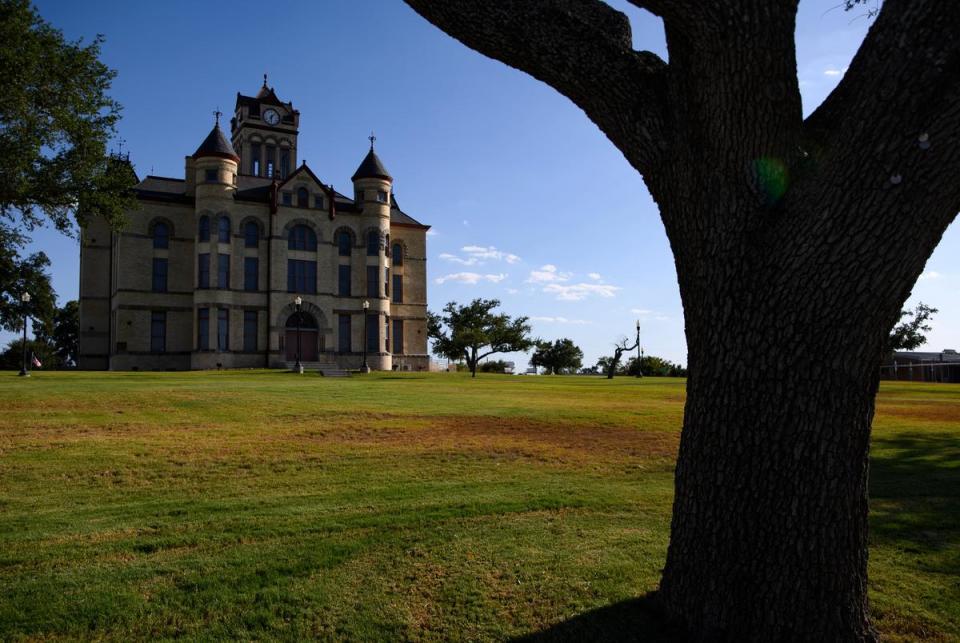
The lawsuits
The Korths were long ensconced on the land and things would have remained that way if not for the landmen that came calling. Spread across the state and country, lines to the Eckfords began ringing, and the effort to lock up drilling rights would bring these two families back together generations later.
The issue moved into the courts in September 2012 when Burlington Resources Oil and Gas Company, a subsidiary of ConocoPhillips, asked a district court to grant them a receivership lease covering the Eckford interest in the 147.5 acres. The legal mechanism is used by companies when they’re unable to locate the mineral rights owners of an estate despite “diligent effort.” It would allow Burlington Resources to drill and set aside any leasing bonuses or royalty payments so the missing owners — in this case, the unknown descendants of Louis Eckford — could later claim them in court.
Three months later, the Korth family filed its own lawsuit, trying to establish that it owned the entire 147.5 acres outright. Drilling would begin that year.
The ensuing dispute captures the parallel yet starkly different stories of the two families, tracing more than a century. Ownership of the tract was passed on through wills and estates over generations on the Korth side and unknowingly carried over on the Eckford side.
Lawyers for the Korth family point to their stewardship of the land and the property taxes they’ve paid over more than 70 years to defend their ownership claim. The Eckfords, they’ve bluntly argued, didn’t come back to Karnes County until the oil and gas companies arrived.
The Eckford descendants have countered that they didn’t initiate this squabble; the companies eager to drill the land did. And it was the Korths, they’ve said, who stopped recognizing their co-ownership of the land even though it was on record.
In their lawsuit, the Korths argued that Eliza Eckford transferred full ownership to Fritz Korth through the 1923 deed of trust used to secure the $300 she borrowed from him, which did not specify that she only owned half. They also claimed full ownership of the land through adverse possession, a complex legal framework under which someone can claim ownership of a property even if it didn’t originally belong to them.
This set off a legal roller coaster of partial victories for each side and winding appeals that have extended the dispute for more than a decade. In 2016, a district judge rejected the Korths’ claim regarding the scope of the 1923 deed, finding that the Eckfords were co-owners, but he agreed the Korths had met the requirements for claiming the land through adverse possession and awarded them ownership without a trial.
The Eckfords appealed with a lawyer in the family, Stella Marks, taking over the case. Marks, who grew up in Texas but had been living in California, hadn’t specialized in oil and gas issues or real property for that matter but she had done appellate work.
She eventually rearranged her life to spearhead the family’s legal case, believing it a service she owed to those who had come before her.
Marks had a modest upbringing; as a child she was bused north from East Austin to what had been a white high school. Her father had been in the military, and her mother worked at a state home for young boys with disabilities. Her grandparents had both graduated from college but could not get teaching jobs because of their race. Instead, her grandfather rose to be the head waiter at premier Austin hotels. Her grandmother operated a tea room for the Black faculty of what would become Huston-Tillotson University, who weren’t allowed in other lunchrooms.
“I had so much responsibility to give back, given the sacrifices that my family made so that I could have a good life,” Marks said.
When the San Antonio-based court of appeals in 2017 ruled the local judge had been too quick to award the Korths ownership, it was the Korth family’s turn to appeal. The Texas Supreme Court rejected their request to hear the case, and the matter was ultimately sent back to Karnes County district court and set for trial in the summer of 2023.
About $574 million worth of oil and gas has been extracted so far in the area that includes the land in question, according to public production data records compiled by the Eckfords’ lawyers. But what share of that is attributed to the 147.5 acres is not a matter of public record. The percentage of royalties to be paid out is likely millions of dollars.
The trial
On a warm July morning, members of the Korth and Eckford families filed into a Karnes County Courthouse recently restored to its original 1895 style. The seat of government looked much as it had more than a century before when the early chapters in the Korth and Eckford saga played out, some in the same second-floor courtroom in which the families would sit during a trial of the Korths’ lawsuit seeking full ownership.
The two families sat on slatted benches on opposite ends of the courtroom. A few shared one bench in the middle. Behind the Eckfords hung portraits of former county judges, including some who appeared to be ancestors of T. D. Ruckman, the banker who had administered Eliza Eckford’s estate and whose name would echo through the courtroom during the five-day trial.
The case, Eckford family lawyer Wayne Collins told the jury, was about two families who settled near Ecleto Creek and tried to grasp at the American dream. The trial itself turned out to be an unconventional setting for two family reunions.
During pauses in the proceedings or while congregating in the hall, the Eckford descendants connected for the first time with distant relatives. They traded photos pulled from pocketbooks and wallets, asked about each other’s children and traced family lineages.
“Now, who are your parents?” was repeated over and over.
Over long tables at lunch, the smaller contingent of Korths traded stories about working on the ranch and recalled how grandfather Romeo had ridden horseback into his 90s. They were divided over his cooking, particularly his famous boiled okra, and were planning a formal family reunion in October.
For roughly 40 hours, including awkward breaks during which the two families mostly steered clear of each other, their attorneys recited winding family histories and laid out the complicated legalities of adverse possession and co-tenancy to a 12-person jury.
Several hours were filled replaying video depositions of the Korth sisters, the landman hired by Burlington and a title attorney, who reiterated that the Eckford children held on to their half interest in the 147.5 acres because Eliza could not have sold to Fritz Korth what did not belong to her.
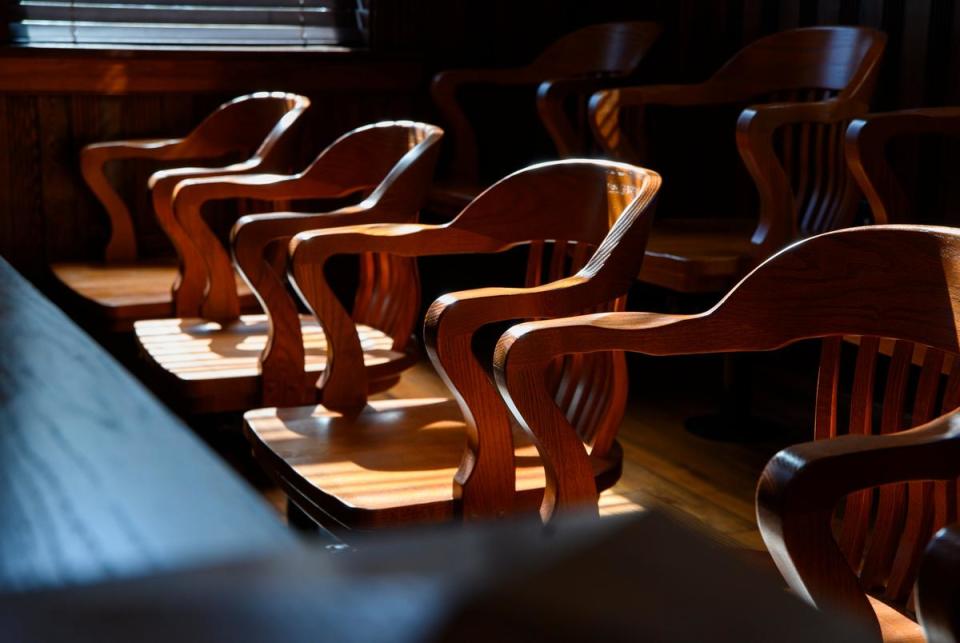
Eckford and Korth descendants also took the stand. Frank Spencer Stubbs, Fritz Korth’s great grandson, offered a detailed look of the ranch’s geography and explained the backstory of a series of photos that chronicled the family’s deep ties to the ranch. It included several images of his mother, Lou Eda, vaccinating calves and working on the ranch but also one of her at age 4 holding a pail in front of cotton shrubs. He also described the family’s efforts to enrich the land — a necessity his grandfather, Romeo Korth, instilled.
“If you don’t take care of the land, your livestock will never survive,” Stubbs recalled him saying.
Among the Eckfords who testified was Thelma Loftis, who at 84 is the oldest living descendant of Anthony Eckford, Louis and Eliza’s seventh child. She said she was there to provide insight into her family.
When he testified, Kneeland Youngblood read off the names of some of the nearly 30 Eckfords who had been in court that week, each standing in the audience as they were called. An educator. A banker. A D.C. lobbyist. An oil and gas man.
Where the Korths had a long and dedicated connection to the ranch, the Eckfords’ presence in the courtroom was subtly framed as the living legacy left behind by Louis and Eliza, who had survived slavery and whose descendants had survived the Jim Crow era.
Though the historical context of the time period in which much of the case’s events played out was evident, it was hardly mentioned.
But the heaviness of that history, that for the Eckfords this was about more than mineral rights, began to weigh over the proceedings as the trial came to a close.
As the judge began reading his instructions to the jury for their deliberations, Marks rose from the attorneys’ table and walked to the back of the room out of the jury's view. Leaning on an archway at the courtroom entrance, she wiped tears from her eyes.
During closing arguments, Marks had composed herself as she spoke of the importance of considering the people behind the events in question to figure out “why they did what they did or didn’t do.”
The ancestors of both families had desired to leave a legacy for their children. That much was clear, she said, before focusing on the Eckfords and the unlikelihood that Eliza would have put her entire legacy at risk for $300.
“When they were born, they were considered property. When they died, they were property owners,” Marks said. Indicating her relatives sitting in the audience, she said, “they are the embodiment of achievement that Louis and Eliza couldn’t have imagined.”
During the Korth side’s closing arguments, a polished, experienced attorney named Ricardo E. Morales stuck to the documents in retelling the story, including the more than 70 years of property tax receipts in the Korths’ names and the deeds given to Fritz Korth. He told the jury the Korths did not consider the two families co-owners, and that the inventory of Fritz Korth’s estate showing only a half interest in the land holds no legal weight.
Even if the Eckfords were once co-tenants, Morales said, the Korths had ousted them from the land over the more than seven decades they had been in possession, legally earning the property.
And he questioned what he called the “118 years of silence from the Eckford children” and why Louis and Eliza’s adult children did not come forward when the land was put up for sale after Eliza died.
“We don’t know why five generations ago they did what they did, but it’s what they did,” Morales said. “Now that [the land] has value, you can’t undo that.”
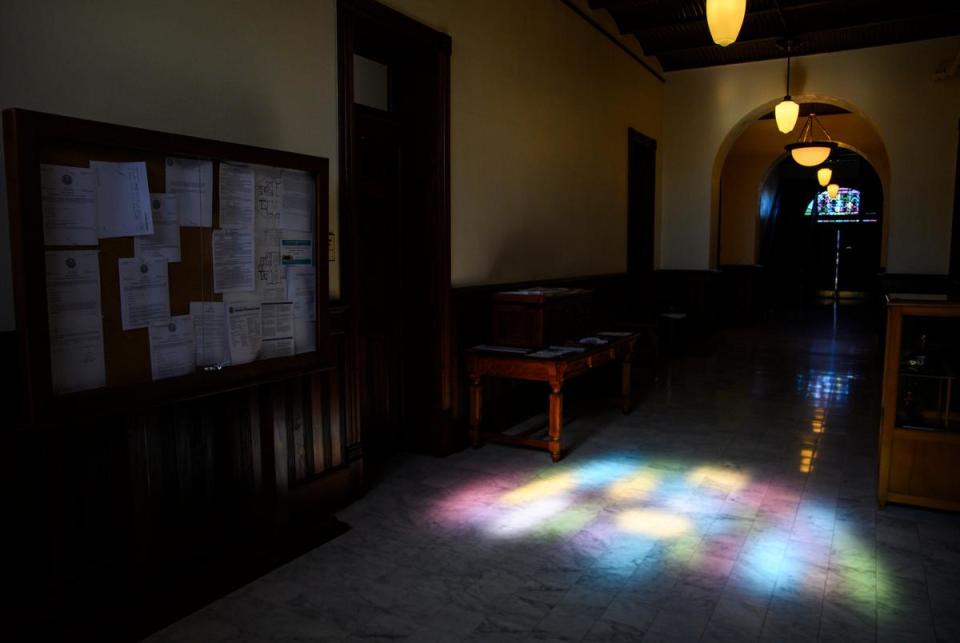
The verdict
Three hours after the jury was sent back to deliberate, a bailiff crossed the creaky floors of the courtroom and handed the judge a note saying a decision had been reached.
The jury faced multiple questions regarding the Korths’ claim that they owned the land in its entirety, including whether the Korths had acquired a presumption of deed, whether they had adversely possessed the land and whether they had acquired full title to the land. The room collectively held its breath as the jury answered “no” to each question.
The Eckfords exchanged both stunned and relieved glances or nods as the judge confirmed that the jurors had agreed on the verdict. Some of them began to quietly weep. “We won,” someone in the family whispered.
The Korths quietly exited the courtroom.
Once the judge gaveled out, the Eckford descendants stood to tearfully embrace each other. At the back of the room, Ethel Turner’s thoughts turned to Willie Jean, whose research had served as a foundation for the legal fight but who hadn’t lived long enough to see it resolved.
“It started with her,” said Turner, a cousin of Willie Jean’s. “She passed, but we picked it up. For her and for all of the family.”
Still, it remains unclear how the decadelong saga will end. The lawyers came back together last week for a post-trial hearing, and the judge must still enter his final judgment in the case. Already, the Korth family’s lawyer has indicated they could appeal and kick off another round of litigation.
“We’re disappointed with the jury verdict,” Morales said two weeks after the trial. “We thought there was plenty of evidence to support the ouster over 72 years of possession, and we’re certainly looking at any and all appellate issues in the case.”
The Eckfords also have a pending legal claim, regarding the accounting of the royalty interests to be paid out from the production on the land. For now, the royalties remain in suspense, as is typical when there’s a title dispute.
But for some Eckfords, the victory came before the verdict.
Craig Smith remembers traveling as a child to Karnes City, the place his grandmother knew as her homestead with a house just four blocks from the courthouse in which he sat all week watching the trial.
He had thought about his grandmother while there, how she had run an upholstery shop in San Antonio at a time when Black people could not easily start businesses and how the case, for all it had taken, had shown their greatness — and the greatness of what Louis and Eliza accomplished. The “richness” of their story was what the family was fighting for, he said.
The Eckfords weren’t asking to be paid back for anything, Smith reasoned. They were questioning why their share in the land was taken from them.
“When people see other people being courageous enough to stand up and ask for justice,” he said, “that’s a great thing because there may be other families, other groups, other individuals that have been taken advantage of through no fault of their own but blocked by a system that was manipulated against them.”
“It’s only justice that people are seeking,” he said.
The full program is now LIVE for the 2023 Texas Tribune Festival, happening Sept. 21-23 in Austin. Explore the program featuring more than 100 unforgettable conversations coming to TribFest. Panel topics include the biggest 2024 races and what’s ahead, how big cities in Texas and around the country are changing, the integrity of upcoming elections and so much more. See the full program.

